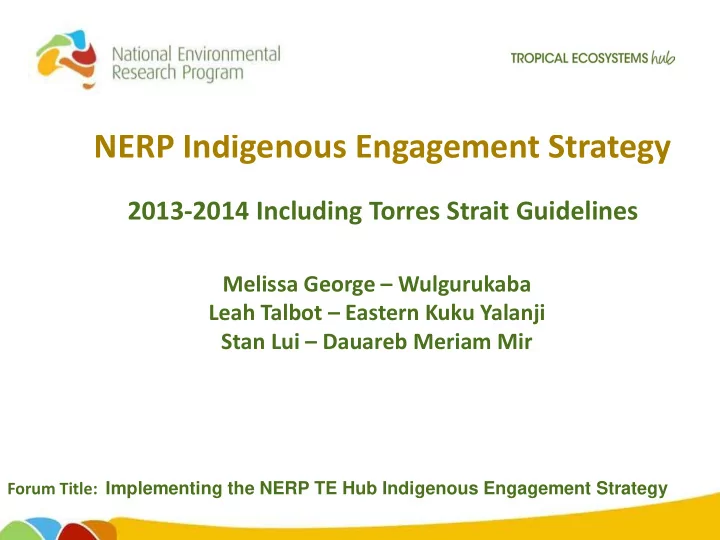

NERP Indigenous Engagement Strategy 2013-2014 Including Torres Strait Guidelines Melissa George – Wulgurukaba Leah Talbot – Eastern Kuku Yalanji Stan Lui – Dauareb Meriam Mir Forum Title: Implementing the NERP TE Hub Indigenous Engagement Strategy
RELEVANCE OF WORK • The overall objective is to facilitate the wide recognition of the benefits of combining and acknowledging Indigenous Ecological Knowledge with western science to manage the natural and cultural environment. • The aim of the NERP Tropical Ecosystems Hub Indigenous Engagement Strategy and Implementation Plan is to scope opportunities and encourage research leaders to consider methods of engagement with traditional owners and Indigenous communities. • To assess opportunities for knowledge transfer between Indigenous groups and researchers during the remaining term of the Hub (2013-2014).
MAIN GOAL • The overall goal of this Indigenous Engagement Strategy (IES) and Implementation Plan (IP) is to: • ensure a meaningful two-way engagement relationship for the NERP TE Hub that will recognise the interests, rights and Indigenous ecological knowledge (IEK) of Traditional Owners in land and sea country, and • to develop a working partnership of Indigenous groups and Hub representatives, including researchers, scienctists and others
OBJECTIVES • To ensure the NERP Tropical Ecosystems Hub research is relevant and of benefit to Indigenous communities and organisations. • To ensure the NERP Tropical Ecosystems Hub research is conducted according to the highest ethical standards and respects Indigenous priorities and values. • To scope opportunities for Indigenous engagement, employment, skills transfer, sharing of knowledge and the increase of cultural awareness amongst all parties. • To effectively communicate research results and share knowledge between Indigenous peoples and researchers. • To facilitate effective Indigenous participation in Hub governance.
TORRES STRAIT APPLICATION • Initial contact to be made with the TSRA LSMU. • The LSMU will then seek formal endorsement from the TSRA Board for research activities. • LSMU project team and community liaison contact PBC, TOs and elders prior to the intended fieldwork. • LSMU confirm if able to assist and accompany the researchers in the field. • Community Notice and Project Factsheet. • If needed, agreement outlining the roles and responsibilities of the researchers and the LSMU staff. • Logistics confirmed with the LSMU at least two months prior. • Feedback to community stakeholders within three months. • Provide results and reports for comment. • Acknowledgement of the support provided.
MAINTAINING RELATIONSHIPS • Continue working with all communities, government agencies and researchers. • Support policy co-ordination, research, planning and adaptive management. • Acknowledgement of the processes for effective engagement. • The “buddy” system of communication. • Conduct research in an ethical manner, mindful of Indigenous cultures and Intellectual Property ownership.
THANK YOU Me lissa Ge o rg e L e a h T a lb o t Sta n L ui
Recommend
More recommend